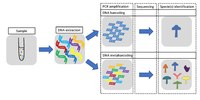
Photo from wikipedia
Nowadays DNA meta-barcoding is a powerful instrument capable of quickly discovering the biodiversity of an environmental sample by integrating the DNA barcoding approach with High Throughput Sequencing technologies. It mainly… Click to show full abstract
Nowadays DNA meta-barcoding is a powerful instrument capable of quickly discovering the biodiversity of an environmental sample by integrating the DNA barcoding approach with High Throughput Sequencing technologies. It mainly consists of the parallel reading of informative genomic fragment/s able to discriminate living entities. Although this approach has been widely studied, it still needs optimization in some necessary steps requested in its advanced accomplishment. A fundamental element concerns the standardization of bioinformatic analyses pipelines. The aim of the present study was to underline a number of critical parameters of laboratory material preparation and taxonomic assignment pipelines in DNA meta-barcoding experiments using the cytochrome oxidase subunit-I (coxI) barcode region, known as a suitable molecular marker for animal species identification. We compared nine taxonomic assignment pipelines, including a custom in-house method, based on Hidden Markov Models. Moreover, we evaluated the potential influence of universal primers amplification bias in qPCR, as well as the correlation between GC content with taxonomic assignment results. The pipelines were tested on a community of known terrestrial invertebrates collected by pitfall traps from a chestnut forest in Italy. Although the present analysis was not exhaustive and needs additional investigation, our results suggest some potential improvements in laboratory material preparation and the introduction of additional parameters in taxonomic assignment pipelines. These include the correct setup of OTU clustering threshold, the calibration of GC content affecting sequencing quality and taxonomic classification, as well as the evaluation of PCR primers amplification bias on the final biodiversity pattern. Thus, careful attention and further validation/optimization of the above-mentioned variables would be required in a DNA meta-barcoding experimental routine.
Journal Title: PeerJ
Year Published: 2018
Link to full text (if available)
Share on Social Media: Sign Up to like & get
recommendations!